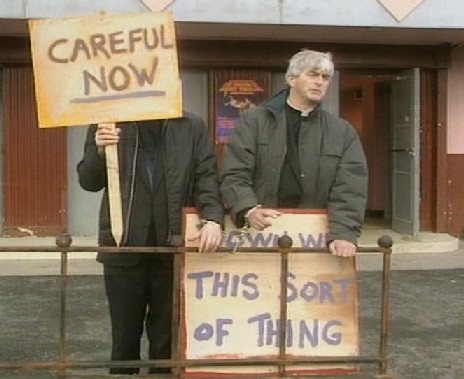At the time of writing, UCU are balloting on strike action in response to (among other things) draconian cuts to USS. My gut reaction is also three letters…. FFS.
Though – spoiler alert – I am going to be voting for strike action very reluctantly and with a very heavy heart.

I wrote a post about strike action and the importance of union membership back in 2013 and on the pensions strike back in 2018. I think both posts hold up pretty well. But briefly, and contrary to popular demand, here are all the things I think about pensions.
- Pension planning seems like a technocratic problem that ought to have a technocratic solution. Or, more properly, a range of technocratic solutions to chose from, depending on our priorities and preference. Which, again, we can talk about.
- Is there is a genuine problem with the pension scheme that’s not been resolved by all of the many, many previous pension cuts we’ve had since I signed up to USS about twenty years ago? Each time we were promised that this cut would resolve the genuine problems with our pension scheme. Each time it hasn’t. If there is still a problem, this ought to be understandable and communicable. And something that can be negotiated about, around, and through.
- But UUK/university management has made this impossible through failures of transparency, dubious consultations, and a level of spin that borders on the Trumpian. It’s all massively counterproductive – we’re not stupid, so stop treating us as if we are. Those minded to at least entertain the thought that there’s an issue with our pension scheme don’t trust UUK, because they have acted – and continue to act – in bad faith.
- My suspicion is that they’ll be back again, and again, and again, and again for as long as they can get away with it. Same arguments each time. Back in 2018 we needed draconian cuts, apparently, and then after sustained industrial action, we didn’t any more. It’s almost as if… etc and so on. Universities may not be for-profit, but university management wants surpluses for reinvestment in their pet projects (at least some of which are genuinely good ideas) because they tend to want to make their mark. So it is in their interests to drive costs down as low as possible and keep them there.
- Colleagues not paying into their pensions because contributions are too high is a problem with our pension. Even if framing the issue as if this was the sole consideration and not mentioning the, you know, massive cuts is disingenuous in the extreme.
- Pensions are not a perk, but deferred salary. Organisations whose continued existence is very certain (broadly, public services) are in a position to provide better pensions. As a trade-off, salaries are lower. We knew this when we chose our careers and expect the deal to be honoured. Why should we have better pensions that some other sectors? Because that was always part of the deal.
- I hate being on strike. I hate the arranging to have some of my work covered with colleagues who are themselves busy, especially when we’re several posts down. I hate the divisions it causes. I hate the stress it imposes and the difficult decisions about who to let down and how. I hate coming back to work to find that I’ve got a huge backlog that only I can clear. I don’t like not getting paid, and essentially having to work for free to catch up.
- Some people like being on strike and the conflict and the associated rituals and the ‘winter of discontent’ cosplaying just that little bit too much.
- Media coverage of all industrial action is always disgracefully one-sided. Management want ‘reform’ and is presented positively… management talking points always lead and they are never challenged by the reporter. Workers are striking for ‘pay and conditions’… presented selfishly or short-shortsightedly. And are always challenged. The framing is always that of management. Always. Strikers will be vilified – ‘won’t somebody think of the [whoever is inconvenienced]’ – with no sense of awareness. The work that the strikers do isn’t important until they stop doing it, apparently. Often they’ll quote someone affected saying how annoyed they are. Again, this will be framed as the fault of the strikers rather than the failure of employers to manage their industrial relations in a competent manner. That question is never even asked, never mind answered. It’s a dance as old as time. Or at least as old as capitalism.
The Four Fights
But it’s not just about pensions. It’s about the ‘Four Fights‘ too.
address the scandal of the gender, ethnic, and disability pay gap
end contract casualisation and rising job insecurity
tackle the rising workloads driving our members to breaking point
increase to all spine points on the national pay scale of £2,500. [to make up for a 17.6% real terms pay cut between 2009-2019]
(UCU website, accessed 18th Oct 2021)
All laudable goals. Especially the pay gaps… it really ought not to be beyond the wit of folks of good will in university management and UCU to come up with an action plan to start to address this. Granted, we cannot solve the problems of discrimination and inequality in wider society, but we can do our bit, and it ought not to be that expensive. I don’t really understand why this is so hard to agree on.
The others, though. Pragmatically… how are they to be achieved? And can they be achieved without costing more? And if not, can we afford all of them, and how do we prioritise?
Let’s get a few red herrings out of the way first.
First, you might very reasonably be very cross about the above-average-inflation pay awards to some vice chancellors and some senior university staff. You might be one of those people who – consistently – thinks this is an issue across the whole economy. Or you may be one of those people who – inconsistently – thinks nothing of the worst excesses of the private sector’s snouts-in-troughery, but objects to anyone in public service being ‘paid more than the Prime Minister’. But… even if we cut executive pay by… let’s say 1/3… this will give us nowhere near enough money by itself to address any of our issues.
Second, you might form the view that there are two many ‘faceless’ managers and administrators. If so, I would invite you to (a) read this piece and reconsider; (b) reflect on the fact that ‘faceless’ just means you don’t know them or understand what they do; and (c)… we’re right here, folks. Striking alongside you. Those of us who can afford to.

Low(er) cost solutions
Let’s consider what could be done quickly and relatively cheaply. How far can humane management/HR practices go in addressing casualisation and job insecurity? A fair bit, I’d imagine. We could be much better at giving researchers permanent or open-ended contracts. Even if the reality is that redundancy processes can and will still be used to terminate contracts where there’s a lack of funding. We can treat our fixed term staff better, and we can take our duty to support the development of our staff much more seriously. We should be setting them up for their next role, whether that’s with the same institution or elsewhere.
Demand for academic posts exceeds supply. This is a topic for another blogpost, because scarcity of opportunity and funding are wicked problems which drive a lot of what’s wrong with research culture. But we could do better about not ruthlessly exploiting that fact for fun and profit. To avoid a race to the bottom for competitive advantage, we need sector wide norms and standards. And as far as I understand it (and correct me if I’m wrong, which I often am) this is what’s being resisted. I don’t believe that we have the most humane management/HR practices, and that’s why I’m reluctantly supporting industrial action on this point.
Can we tackle rising workloads without spending a lot of money? Again, there are certainly some things we can do. I’ve been coordinating my university’s response to the Review of Research Bureaucracy, which has been an eye-opening experience. It’s only looked at externally imposed bureaucracy, and only research bureaucracy. It may be that the real issue is internally imposed research bureaucracy, teaching bureaucracy (especially), and, well, administrative bureaucracy. I’m sure there’s more that can be done, and some of that may involve employing more administrative and managerial support. My vision is of a university where academics do academia, and administrators and managers do administration and management. And we do leadership together.
We might expect universities to take a long, hard look at what’s expected of the average academic and review what expectations are reasonable. Too many institutions have grant income targets that are scarcely on a nodding acquaintance with reality. They appear not to understand that limited funding means that for some to succeed, others must fail. I know it’s fashionable to blame the REF for everything. But actually the last REF rules that moved away from demanding four publications per researcher opened the door to greater flexibility of roles and expectations.
But for all the talk of ‘be kind’ and yoga and wellness and mindfulness and whatever else, there’s still far too much unkind management and unrealistic expectations. Personally, I’m currently lucky to benefit from supportive, enlightened and empowering management (hello, if you’re reading), but I’ve also experienced the opposite and there’s far too much of it about. Whether sector-wide strike action is the way to address rising workloads I’m not sure. What could we do at a national, sector-wide level? What would that look like? I’m convinced of the importance of the issue, but less so for the case for national strike action as the mechanism to resolve it. But I’m open to persuasion.
Fantasy Head of School
But another possible response to rising workloads is… well… sorry… it’s casualisation and job insecurity.

Let’s play Fantasy Head of School. Or University Management Simulator. Hypothetically, anyway. Pressures on your permanent staff too great? Use your limited resources to buy in as much extra teaching capacity as possible… which means sessional teachers and short term teaching fellowships or teaching-focused roles. Or… we treat those staff better, give them more professional development time, more scholarship time, and we get less teaching capacity for our buck. And increase workloads.

That’s not the only issue – creating better bottom-rung-of-the-academic-ladder jobs – more hours, longer contracts – almost certainly means fewer such opportunities. Is that a good thing? I think, on balance, probably… but it’s not straightforward. My one remaining reader will no doubt be sounding the ‘false dichotomy’ klaxon at this point. Correctly so. We can, of course, find a compromise or a balance of sorts, but let’s not pretend it’s straightforward. We can’t have everything.
Do we employ more staff (to reduce workloads) on more secure contracts (to reduce insecurity)? Or do we address the real terms 17.6% pay cut by increasing all spine points by £2.5k? And – dare I say it – paying higher employers’ pension contributions, if that is indeed actually needed. What gets priority? You’ll forgive me if I would rather see any £££ for pay rises focused at the lower end of the pay scale rather than giving Profs another two and half grand. Whisper it quietly, but I’d rather spend it on the lowest paid university employees who tend to be represented by UNITE or UNISON rather than UCU. And a focus on the lowest paid/lower spine grades and spine points might also be a good way to start addressing pay gaps.
Pay costs and non pay costs
As Fantasy University Manager, could we hack away at non-pay costs? Conference funding? Seedcorn funding for new research ideas? Research facilities and infrastructure? The university’s core infrastructure and systems which – when working well – create efficiency savings and minimise friction? Estates and buildings? Student spaces? Lecture theatres? Seminar rooms? One of my constant frustrations as a Research Development Manager is working with brilliant colleagues with outstanding ideas who we can’t support with kit/seedcorn ££/infrastructure as they deserve.
I’ve read in a number of places that the percentage of average university income spent on staff costs has been in decline for some time. The best source I can find for this is this UCU article from 2017. I’m wary about trying to dive into HESA stats as I’m not competent to play with financial data without water wings and a lifeguard. If anyone has any better sources/more up to date info, please let me know via twitter, email, or in the comments. This decline may or may coincide with a long run of real term pay cuts, and that may be related. Or not. I’m also not sure what the percentage of staff costs for an organisation ought to look like… my instinct is that under 54.6% seems very, very low. But I’m not sure why I think that… some half-remembered presentation? Or a Business School research grant application? But if it is low, I don’t know why that might be, or what it might mean.
I’m not sure what I think about grand estates/infrastructure projects. Obviously some have gone very well, others very badly. Can we reduce investment on estates and infrastructure to spend more on staffing? There’s a balance to be struck. One option is that we say the balance has swung too far, and we cut back and spend more on staff. Another option is that we end everything but essential maintenance to spend more on staff, but that’s not sustainable in the long run. Unless we want dilapidated lecture theatres and ageing research kit, because if that happened we’d be the first to complain about a lack of investment.
Let’s assume for the sake of argument that the pendulum has swung too far, and that there is extra money at all or most institutions if it were to cut back or delay or cancel some estates and infrastructure projects. Even on top of whatever COVID-related cuts have been made. If there is that money available, how do we spend it? Because I’m not convinced that there’s enough of a saving there to cover everything that UCU is asking for.

There isn’t a magic money tree. Pragmatically speaking. The resource envelope is what it is. Unless anyone is willing to spend, spend, spend and dare the government to shut them down or bale them out. Perhaps £££ will be increased under a future government of a more progressive frame of mind willing to invest more in public and quasi-public services. But that won’t happen in the short, or perhaps even medium term. And when it does, I suspect that universities will be some way down the priority list. As Fantasy Head of School, you need to make decisions now.
I’m aware, of course, that UCU’s demands are a wish list, a negotiating position. It’s also a way of achieving a broad consensus among colleagues whose interests are not precisely aligned. If we look at the Four Fights and the Pensions situation purely selfishly, we’d not all have the same list of priorities.
But ultimately, we have a long list of demands. Some of which can be met or addressed without prohibitively expensive measures… but for others, if there is money available, we’ll need to prioritise. And that priorisiation is likely to be controversial and uncomfortable. And we can either engage with prioritisation, or we can leave it to university management.
I know which I’d rather do.

